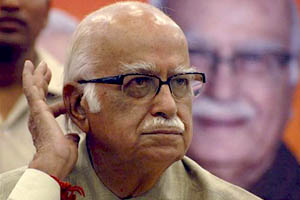Shevgaon (Maharashtra), April 1: Addressing his first rally for the 2014 election, senior BJP leader L.K. Advani on Monday sought to place his party’s prime ministerial candidate Narendra Modi in the same league as two other BJP Chief Ministers, Shivraj Singh Chouhan of Madhya Pradesh and Raman Singh of Chhattisgarh, saying the Gujarat Chief Minister was not the only one to have scored a hat-trick of electoral wins.
 “Our Modiji isn’t the only one who has scored a hat-trick in elections. Shivraj Singh Chouhan and Raman Singh have also been elected thrice like him,” said Mr. Advani, who no longer enjoys the authority he once did in the party, campaigning in Ahmednagar.
“Our Modiji isn’t the only one who has scored a hat-trick in elections. Shivraj Singh Chouhan and Raman Singh have also been elected thrice like him,” said Mr. Advani, who no longer enjoys the authority he once did in the party, campaigning in Ahmednagar.
The BJP veteran, who did not want to contest from the Gandhinagar seat again, was looking at Bhopal as an option where Mr. Chauhan, known to be close to him, calls the shots.
Interestingly, none of the top BJP leaders from Maharashtra was present at Mr. Advani’s rally in Shevgaon, which is part of the Ahmednagar constituency, from where sitting MP Dilip Gandhi is seeking re-election.
Quite aware that his statements would be closely watched at the public forum, Mr. Advani, however, went on to say that Mr. Modi would form the government at the Centre, which will change the face of India.
Speaking about his 1990 Rathyatra demanding a Ram temple at the site of the Babri Masjid, Mr. Advani pointed out that it was Mr. Modi who accompanied him at the time.
While praising former Prime Minister Atal Bihari Vajpayee’s administration, Mr. Advani attacked Prime Minister Manmohan Singh as being a person with a post but without any power.
“We formed three new States, but problems like Telangana never arose. Despite economic restrictions imposed by America after the Pokhran blasts, we never let inflation get out of hand,” he said.
“Had he [Mr. Vajpayee] got one more chance in office, we would have completed the project of connecting rivers for the benefit of farmers,” he added.
Mr. Advani, who did not refer to the late Shiv Sena chief Bal Thackeray during his entire speech, returned to pay tributes to his memory after ending his address.
The Shiv Sena leadership had reportedly conveyed its unhappiness to the BJP over Mr. Modi’s omission to mention the Sena founder’s name in his Mumbai rally a few months ago.







Comments
Add new comment